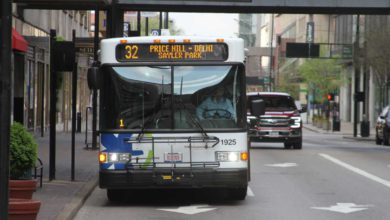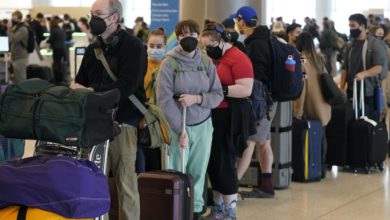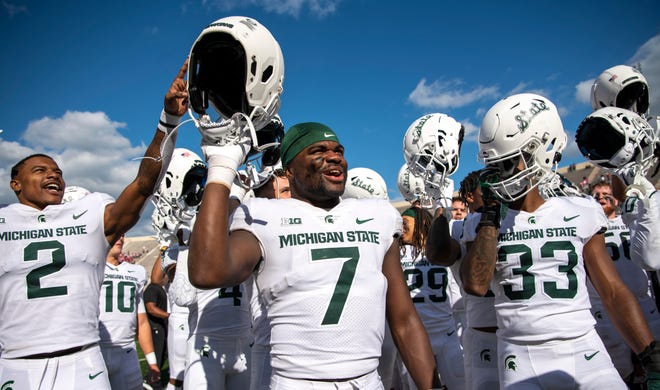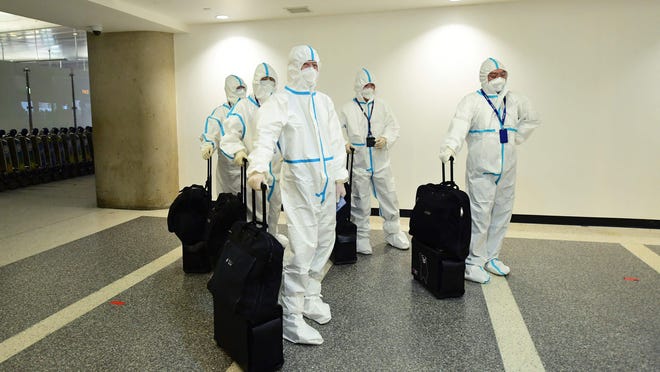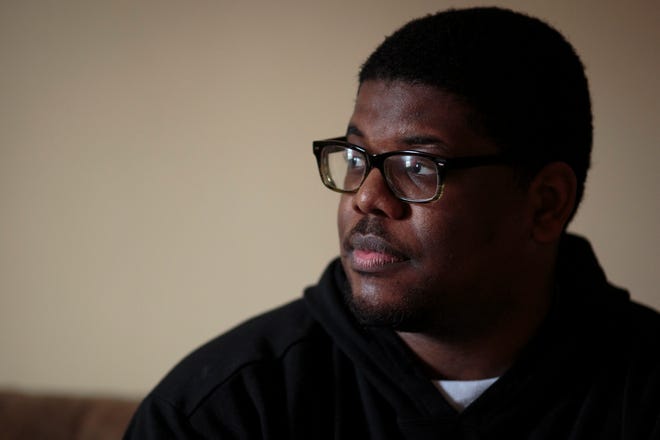

Dumariyea Ballew was still in training at his first job out of college when he was laid off because of the COVID-19 pandemic.
“I have never been laid off of a job before,” he said. “I've never even been fired from a job before.”
When Ballew got the job as an admissions counselor for Chatfield College after graduating from the University of Cincinnati, he thought it would be a good first step to his dream of being an academic advisor.
His new job started in early February 2020. Ballew was laid off in late March. Now he was back at square one in the middle of a pandemic.
At first, Ballew was optimistic he would find something quickly.
He didn’t.

Instead, he spent months checking job sites and reaching out to people, trying to find something. He got a job at Jimmy John’s just to pay the bills.
“For a while, I thought that I was doing stuff wrong,” he said. “I felt discouraged. I felt like I wasn't a proper adult.”
***
For a lot of young people, the concepts of adulthood and having a job are tangled up in one another.
A real job means that they're self-sufficient, that they're responsible for taking care of themselves and their debts.
But the COVID-19 pandemic has kept young Americans disproportionately out of the workforce.
Even before the pandemic, the job market for young people wasn’t stellar. According to data analysis by the Economic Policy Institute, the unemployment rate in spring 2019 for people ages 16-24 was triple the rate of people over the age of 25.
The pandemic only made things worse. Roughly one-fourth of young people were unemployed during the height of the pandemic recession in late spring 2020, compared to around one-tenth of older workers.
Young Black, Hispanic, Asian American and Pacific Islander workers had higher unemployment rates than their white peers.
By halting educational and job opportunities for young people, the pandemic has created a crisis around adulthood. Between February and June 2020, nearly one in three young people was “disconnected” or not working or enrolled in school, according to an analysis of U.S. census data by the Pew Research Center.
Even as vaccines started flowing to the public and the first anniversary of the pandemic passed, there’s still no clear idea of what an end to all of this looks like.
Meanwhile, young people across the country, unsure and unmoored, are stuck somewhere on the brink of the rest of their lives.
***

On a typical day, Ian Ralston rolls out of bed in his childhood home in Mason and turns on his computer. He checks his emails, LinkedIn and Indeed and shoots off messages reaching out to people about different opportunities.
Ralston has been trying to find a job since he graduated from Miami University last May. The months of trying to find something have taken an emotional toll.
“It’s been frustrating,” he said. “I don’t know how much longer I can take this.”
Ralston lived at home during college with his parents and brothers. He’s thankful his parents are still letting him stay with them as he looks for a job, but his plan was always to move out once he graduated.
“I want to become financially independent, my own person,” he said. “I had all of these plans I wanted to do. Travel. Be successful. Do all the things I dreamed of. That’s all on the back burner.”

According to an analysis by the Pew Research Center of U.S. census data, the pandemic has caused millions of young adults to move in with family. More 18-29-year-olds lived with one or both of their parents in July 2020 than any time since the Great Depression.
Ralston wants to work in emerging technologies like artificial reality and machine learning. Before the pandemic started, he was in his senior year at Miami, getting his Bachelors of Arts in Emerging Technologies in Business and Design.
“Tony Stark-type things,” as he described it.
He got an internship in Cincinnati as part of his program in January right as he was starting to look for jobs. It seemed like that could turn into a full-time job once he graduated.
At the end of April, after letting go of all the other interns but him, the company told Ralston it wouldn’t be able to take him on full-time going forward because of the pandemic.
Ralston had started reaching out to some professional contacts when it seemed like his internship wouldn’t become a full-time job. As he graduated, Ralston’s back-up plans began to fall through, too, as the downturn in the economy made many companies freeze hiring. He started to panic.
Most of the time when he’d apply for jobs, he’d hear back, “Sorry, we’re not hiring right now,” if he even heard back at all. He had a few opportunities that seemed like they would turn into something.
The emotional burden of not finding a job is compounded by a financial one. Ralston took out around $27,000 in private student loans on top of his federal loans to help pay for school.
While the government has suspended payments on federal student loans for all borrowers until September 2021, payments on Ralston’s private loans resumed in January.
He’s paid off some of his loans by doing some freelance work and dipping into his savings. But for now, he has $25,500 left on his private loans and $2,000 in his bank account.
If he doesn’t get a job soon, he might default on his loans.
“I just want something to happen before then," he said.
***
The pandemic has put everyone through the emotional and mental wringer, but young people’s mental health has fared worse than other age groups.
According to analysis of census data by the Kaiser Family Foundation, more than half of adults ages 18-24 reported as of December 2020 symptoms of anxiety and/or depressive disorders.
The Centers for Disease Control and Prevention found roughly almost 25% of young adults in June 2020 had started or increased use of a substance to cope with pandemic-related stress or emotions, compared to 13.3% of all adults surveyed.
The same CDC survey found roughly one in four young adults had seriously considered suicide in the past 30 days.
KFF noted in its report that young people have experienced a number of “pandemic-related consequences” that could contribute to poor mental health, such as university closures, loss of income or transitioning to remote work.
***

Tyla Thompson has wanted to work with children since she was a child herself. She's worked and volunteered in education for years, and her dream job is to be a guidance counselor.
Thompson graduated in December, but she doesn’t think she can go into a career in education until the pandemic is over. Having worked with children before, she knows how they can spread germs. She wouldn’t want to potentially expose the children she works with to COVID-19 or be exposed to it by her students.
She finds it difficult to breathe in a mask for even short trips to the grocery store. She doesn’t think she could wear one for seven or eight hours straight as she tries to work with kids or any other job.
"That's a lot for me, and I know that's a lot for them," she said.
But working remotely isn’t the obvious answer to her problems.
Thompson was still a student at UC last March when classes were suspended and shifted online. On-campus housing closed down, and she had to scramble to move her things back into her father’s home in College Hill.

Once she was there, Thompson struggled to settle in and focus on school without a dedicated workspace. Online classes were anxiety-inducing to the point that the 24-year-old would start having panic attacks after sitting at a computer all day.
She now has a hard time with long amounts of screen time because of the stress online classes caused her. Since graduation, she rarely touches her computer and doesn’t watch as much TV.
"I feel like I'm literally stuck," she said.
For right now, Thompson’s spending her time FaceTiming friends, painting and listening to music. She redecorated her bedroom to make the space feel more adult and less “little girl.”
But Thompson knows she can’t be unemployed until the pandemic is done.
Whenever that will be.
***
As vaccines become more widespread, the world is tentatively imagining what an end to all of the safety precautions and terror will look like.
For young people trying to enter the job market during the pandemic, their futures might be permanently affected.
The economic downturn triggered by the COVID-19 pandemic was the fastest and deepest recession in U.S. history. A year later, there’s been some recovery, but the Congressional Budget Office predicts the number of employed Americans won’t reach its pre-pandemic level again until 2024.
Research has found young workers are harmed by entering the job market in economic downturns. They typically earn less, have greater earning instability and go through more periods of unemployment than similar people who enter the market at a better time. These effects get magnified for nonwhite workers and high school dropouts.
Recessions could also potentially have long-lasting consequences on not only a person’s economic health but his or her physical health as well.
A working paper by Northwestern University and UCLA researchers found people who came of age during the recession of the late 1980s were likelier to die in their 30s and 40s than those who came of age outside of recessions. They were also less likely to be married, more likely to be divorced and more likely to be childless.
Economic recovery is happening, albeit slowly.
A year after the pandemic began, around 58% of the 22.4 million jobs that were wiped out have returned. Experts believe the $1.9 trillion relief package passed in early March will help the U.S. economy grow at its fastest annual rate since 1983.
But the damage of the pandemic and its recession may linger for an entire generation of American workers.
***
When he was struggling to find a job after getting laid off, Ballew would remind himself of where he came from and where he wanted to go. How he spent four years in school getting a degree so he could get a good job.
Finally, Ballew found a full-time position in the fall as an AmeriCorps member working at a nonprofit based in Price Hill. He now works remotely from the home he shares with his grandmother in College Hill.
At his new job, Ballew helps people who were in the same position he was, trying to find employment or figuring out how sign up for government benefits. He likes the work.
His contract is only for a year, which gives him time to look for another job or potentially get a different contract at his current one. He doesn’t have to worry about how he’s going to pay his bills for now.
He took the job because it was a good way to build experience and would help with student loans.
“I'm trying to think more optimistic about it because, hey, at least I'm employed,” he said.
The pain of the pandemic still has managed to seep through the victory of finding a job. Ballew lost a family member to COVID-19 in December 2020.
The pandemic has taken a lot from Ballew, just as it has taken so much from others. To take care of himself, he keeps looking forward.
"I have to constantly remind myself," he said, "to keep going."
Source link

